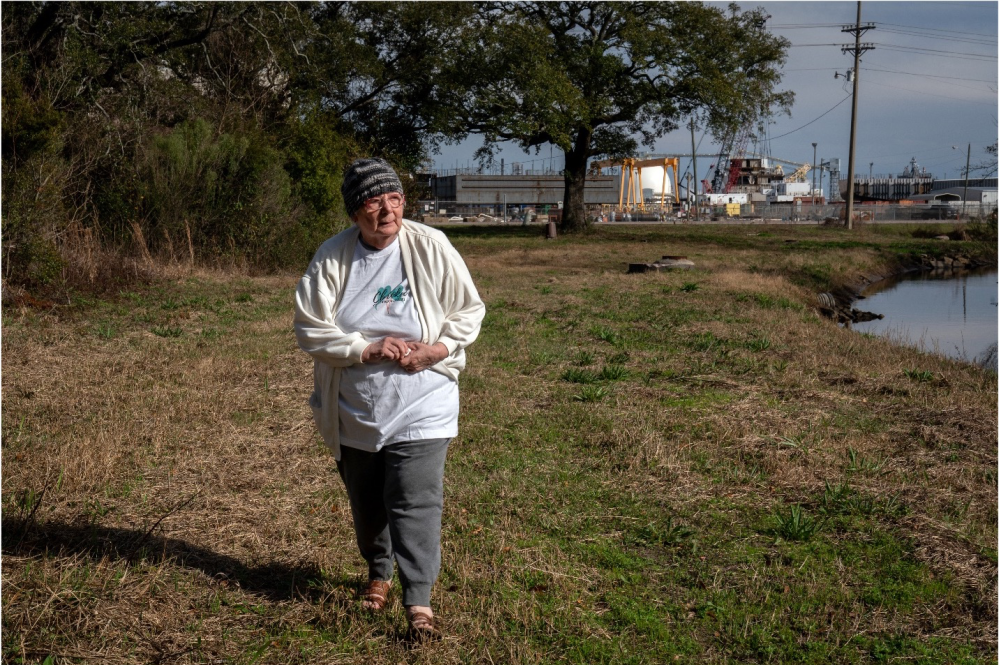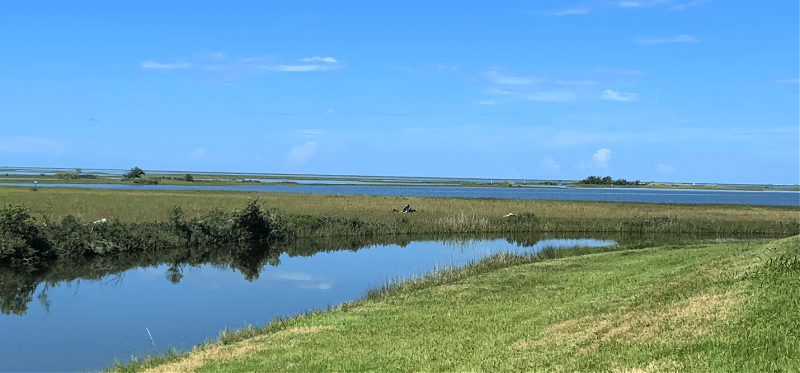
A pair of small, community-based organizations, one in Mississippi and the other in South Carolina—members of the national environmental coalition A2—are celebrating victories after court rulings halted manufacturing toxic to their health.
Cherokee Concerned Citizens (CCC) of Pascagoula, MS—led by Barbara Weckesser—sued the U.S. Environmental Protection Agency and won after a judge invalidated EPA’s approval for Chevron to produce jet fuel oil from discarded plastic. Chemicals in the process are known to cause cancer.
CCC’s success is the subject of an article by ProPublica, which led an investigation in partnership with The Guardian on EPA’s initial approval for Chevron to engage in the toxic manufacturing process.
The Gullah/Geechee Sea Island Coalition of St. Helena Island, SC, led by Queen Quet, joined a coalition that was successful in getting a judge to stop the U.S. Department of Energy (DOE) and the National Nuclear Security Administration (NNSA) from going forward with production of plutonium pits at sites in South Carolina and New Mexico.
A plutonium pit is a hollow sphere of plutonium about the size of a bowling ball that forms the core of a nuclear weapon and triggers the explosion. Plutonium processing is one of the most dangerous manufacturers in the world.

Barbara Weckesser in her Pascagoula, MS neighborhood with manufacturing plants in the background. Photo by Rory Doyle.
Kept in the Dark
Pascagoula is a fence line community where residents are used to having industries, as Weckesser puts it, “dump their garbage and trash on us.”
But Chevron’s plans to produce fuel from oils extracted from plastics—a process that would release cancer-causing toxins in their midst—proved to be one insult too many for residents.
The fact that Weckesser and her neighbors found out about Chevron’s plans via a news app was particularly galling. “No one reached out to us at all,” she said.
Chevron’s Pascagoula oil refinery is the corporation’s largest and one of the biggest in the country, generating $10 billion in annual revenue. It’s also one of the most polluting: Operations there have emitted into the air and soil heavy metals and volatile compounds, including benzene, xylene, toluene and ethylbenzene.
Now, the U.S.-based multinational corporation plans to produce jet fuel from oils extracted from plastics. The process of extraction—called pyrolysis—emits carbon monoxide, nitrogen oxides and sulfur dioxide, increasing air and water pollution.
Some of the chemicals emitted during Chevron’s process are so toxic, it would give one in every three to four people cancer who live in a three-mile radius of the plant.
The EPA has hailed this repurposing of plastics as “climate friendly,” and in line with an effort the agency announced in 2022 under the Toxic Substances Control Act “to streamline the review of new chemicals that could be used to displace current, higher greenhouse gas emitting transportation fuels.”
Although Chevron’s plan involved purchasing the oils from another to then turn it into jet fuel, Weckesser discovered via EPA’s own study that some of the chemicals emitted during Chevron’s process are so toxic, it would give one in every three to four people cancer who live in a three-mile radius of the plant. “That’s the whole city of Pascagoula!” said Weckesser.
According to ProPublica/The Guardian, the EPA has not released the list of cancer-causing chemicals to the public, citing the need to preserve Chevron’s corporate confidentiality against competitors. A portion of the report that ProPublica/The Guardian was able to obtain had a redacted list of the offending chemicals.
Alarmed by what they did know, Weckesser’s group felt they had enough information to take legal action and reached out to a local attorney who connected them with Earth Justice, a nonprofit public interest environmental law organization.
In April 2023, Earth Justice filed a suit in the U.S. Court of Appeals for the District of Columbia Circuit on behalf of CCC asking the court to invalidate EPA’s approval for Chevron to produce the fuel.
EPA needs to follow the law and protect people at the fence line, not greenwash for Chevron by passing off the company’s plastic-waste fuel as a solution to the climate crisis.
In a statement released at the time the suit was filed, Earth Justice, stated that “under the Toxic Substances Control Act, EPA can’t approve new chemicals with serious health or environmental risks without identifying and implementing ways to minimize the dangers. The agency can also order lab testing that would clarify such risks. EPA did not do either before approving Chevron’s request to produce this hazardous fuel.”
Earth Justice attorney Katherine O’Brien, who represented CCC on the case, added, “EPA’s decision to let Chevron poison the community in Pascagoula with chemicals posing astronomical cancer risks makes a mockery of the agency’s stated commitments to environmental justice. EPA needs to follow the law and protect people at the fence line, not greenwash for Chevron by passing off the company’s plastic-waste fuel as a solution to the climate crisis.”
Weckesser said she is pleased with the ruling and thanked Earth Justice for stepping up to take on the case. But she felt the whole issue could have been avoided if the EPA focused more on protecting taxpaying citizens and less on furthering the interests of industry.

Queen Quet, Chieftess and Head-of-State for the Gullah/Geechee Nation. A2 file photo.
Protecting Her Heritage
St. Helena Island is a coastal South Carolina community steeped in history. The island is part of the Gullah Geechee Cultural Heritage Corridor, a National Heritage Area established by Congress to officially recognize the historic and cultural contributions of the Gullah Geechee people.
The Gullah Geechee people are the descendants of enslaved Africans who worked the coastal rice, cotton and indigo plantations of North Carolina, South Carolina, Florida and Georgia. The plantations’ isolated locations facilitated the retention of many indigenous African traditions around food, arts and crafts, spirituality and even the remnants of an African-English hybrid dialect. Queen Quet was born on St. Helena Island and is a fierce protector of this community and its uniquely American culture.
So, when she learned of a proposal to produce plutonium pits in South Carolina that could negatively impact the waterways around her hometown, Queen Quet sprang into action. Her group, the Gullah/Geechee Sea Island Coalition, joined with other front line organizations to halt the radioactive project. The other groups involved in the fight were the Savannah River Site Watch (Columbia, SC), Nuclear Watch New Mexico, and Tri-Valley Communities Against a Radioactive Environment (Livermore, CA).
At issue: the Department of Energy and the National Nuclear Security Administration had planned to produce plutonium pits at the South Carolina Savannah River (SRS) site and New Mexico’s Las Alamos National Laboratory. Once a production site for plutonium and tritium during the Cold War, the SRS now functions primarily for environmental cleanup, waste management, and research and development. Las Alamos is the town made famous—or some would say infamous—as the site of nuclear tests during World War Two. The lab there is now a research and development center for NNSA.
Plutonium is a highly radioactive substance that can travel through the air and can settle on soil and water.
The pit production project proposed for the two sites has been criticized for being very expensive, extremely hazardous and maybe unnecessary (the end product is not currently needed for military weoponry).
A federal judge ruled in a U.S. district court on October 1 that the project could not go forward, citing the federal agencies for violating the National Environmental Policy Act (NEPA) by failing to consider alternatives to producing the pits, and ordering the agencies to conduct a full environmental impact statement on how the pit production would operate. Plutonium is a highly radioactive substance that can travel through the air and can settle on soil and water. The health effect from direct exposure to plutonium is death, either immediately or from cancer.
In a statement released by the South Carolina Environment Law Project at the time of the ruling, Ben Cunningham, an attorney with SCELP, who represents the plaintiffs, said “This is a significant victory that will ensure NEPA’s goal of public participation is satisfied. Public scrutiny is especially important because the activities at issue here, by their very nature, result in the production of dangerous weapons and extensive amounts of toxic and radioactive waste.” SCELP is a non-profit public interest law firm dedicated to the protection of South Carolina’s environment.
Tenk GAWD fa disya! Native Gullah/Geechees…rely on safe and healthy water in order to sustain ourselves and our community.
In the same statement, Queen Quet, partly speaking in Gullah dialect, added, “Tenk GAWD fa disya! Native Gullah/Geechees, including the Gullah/Geechee Fishing Association and Gullah/Geechee Sea Island Coalition members, rely on safe and healthy water in order to sustain ourselves and our community. Therefore, it is critical that the public is fully aware of any and all potential negative impacts that projects will have on critical resources such as our water supplies and water bodies.”
Words of Advice – And Resources
Despite the seemingly “David vs. Goliath” dynamics of both their situations, the groups represented by Weckesser and Queen Quet prevailed.
The key to their success?
“We didn’t back down,” said Weckesser, even when the EPA kept insisting the group had been notified about Chevron’s plans. Her advice to environmental groups that may find themselves facing a fight with the feds: “Stay strong!”
Queen Quet offers similar advice: “You must have faith if you’re fighting a righteous fight. Stand and stay strong!”
Both leaders have been active members of A2, which, since its founding in 2017, has become the nation’s largest coalition of frontline communities fighting for environmental protection.
In addition to providing pro bono technical support and assisting in securing grants, A2 aims to bring together these frontline leaders—at monthly forums, for example— to share resistance strategies that may lead to success. Now there are two more community-based groups with victories under their belts and stories to tell.

